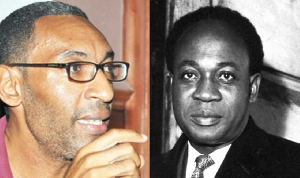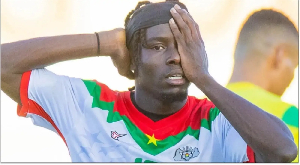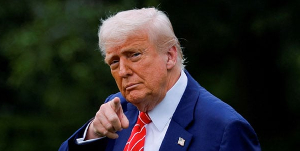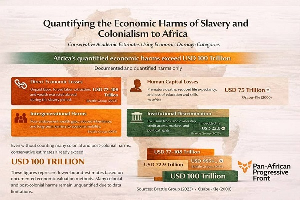This segment of our ongoing discourse is perhaps also the most heart-rending and difficult, if also because it is ineluctably the most intimate and personal. For good or ill, the protean and unpredictable circumstances of history have determined that I rake over the familial wounds of a moment in Ghanaian political history that indisputably transcends the parochial bounds of my family. But, needless to say, it is that painful aspect of Ghanaian colonial history that I wish I could have been spared, being also the glaring fact that this tragic familial event occurred about two decades before this writer was born. And in the writing, which as a trained historian I can only ignore at the premium peril of my scholastic credibility, the greatest reward in the aspiration of any well-meaning scholar, I find myself resurrecting the tranquil spirits of my ancestors, notably my maternal grandmother, Grace Ateaa Agyeman-Sintim, whose fond and first-cousin the tragic subject of this segment of our discourse pertains.
The story itself was serendipitously brought to my attention by Mr. Kwaku Odame, the royal herald of the right-wing divisional commander of Akyem-Abuakwa and King of Akyem-Asiakwa, who also happens to be my paternal grandfather, and whose name and appellation I bear as, perhaps, the most significant symbol of my ethnic and cultural identity. It was some time between 1971 and 1973; and like Mr. Odame, I was learning for the very first time that I was, indeed, related to the right-wing divisional chief, or commander, of the great State of Akyem-Abuakwa. My father had, of course, related many things to me about both sides of his family; but for some quite curiously capricious reasons, the old man had failed, or perhaps even forgotten, to apprise me of my royal moorings. Not that it mattered very much to me as a young boy. To be certain, my fullest appreciation of the double-edged sword that is one?s unsolicited familial background of privilege still lay well into the future. And since my arrival into full knowledge of my familial privilege, I have never ceased envisioning it as a hefty burden, oftentimes unnecessarily so, particularly if you did not grow up savoring such privilege. So I guess what on occasion masquerades as my privileged background is actually one that is largely remote and vicarious. Even so, it is one from which I derive immeasurable pride.
Alas, regarding the occasion under discussion herein, there can be little pride that may be aptly deemed to be derivable. Not even my chance but quite edifying discovery, a little over three years ago, that I was also the grandson or grandnephew of the Okyenhene, the Paramount King of Akyem-Abuakwa. For needless to say, power comes with grave responsibilities which sometimes border on the sanguinary and ineffable. For in this instance, the flagrant deeds of the fathers and grandfathers may carry down through umpteen generations. For even when we are scientifically and historically deemed to be inculpable or innocent, you can almost be certain of this singular and incontrovertible fact: Each and every one of us is inextricably implicated in our heritage; and it is for this reason that we often find and hear the totally innocent descendants of former slave-owners incessantly apologizing for the untold crimes of their forebears of yesteryear.
For me what remains to be resolved once and for all, as it were, is the brutal murder of my maternal granduncle, Nana Akyea-Mensah, of Akyem-Apedwa. And we have been forced to take this matter up because some of his ardent, albeit rather sophomoric detractors, have dared to implicate Dr. Joseph (Kwame Kyeretwie) Boakye Danquah, another granduncle, in the apparently brutal assassination of another granduncle, Nana Akyea-Mensah.
In his book titled Murder And Politics In Colonial Ghana (New Haven: Yale University Press, 1993), veteran British, Africanist historian Richard Rathbone poignantly notes: ?At the heart of this book are several interwoven stories about the disgrace of an African royal family, the decline of a great African state and then the dismal twilight of the career of one of Britain?s most progressive colonial governors?(ix). Of course, the ?royal family? in question is the august Ofori Panyin Fie, or the House of Ofori-The-Elder. The ?great state? in ?decline? is Akyem-Abuakwa, just as the ?progressive colonial governor? whose hitherto brilliant career has fizzled into the virtual dust-bowl of a ?dismal twilight? is none other than the celebrated Sir Alan Burns, the uncannily sympathetic colonial principal whose eudaemonious collaboration with Dr. Danquah culminated in the auspicious establishment of the University College of Ghana, against the ?better judgment? of the British Colonial Office. In his assessment, Rathbone mentions his reading of a memoir by H. A. Nuamah titled An Account of the Kibi Ritual Murder Case. Indeed, it must have been an earlier version of the latter book that Mr. Odame, the royal herald of the Asiakwahene, availed men while I was a pupil at the Akropong Presbyterian Middle Boys? Boarding School during the 1970s. And if memory serves this writer fairly, Dr. Danquah was nowhere implicated in the brutal assassination of Nana Akyea-Mensah, even though some of the male sons and other relatives of the late Osagyefo Nana Sir Ofori-Atta I were implicated, and indeed several of them were executed by hanging, while the rest served various terms of imprisonment.
However, before we delve fully into a dispassionate examination of the issue at stake, it bears emphasizing that Mr. Nuamah served at the highest levels of the Ghana Police Force during the indisputably momentous and checkered era of CPP political stranglehold. And while the preceding observation in no way detracts from the credibility of the author, or the forensic fact that, indeed, a heinous and barbaric crime was committed, we, nevertheless, emphasize the preceding in order to highlight the fact that President Nkrumah seized on the Akyea-Mensah case by way of a clinching of political capital. And, indeed, as Richard Rathbone poignantly observes: ?In his autobiography [i.e. Ghana: An Autobiography] Kwame Nkrumah, the Gold Coast?s first Prime Minister and Ghana?s first President, described the case and his view of its importance to the motivation of a group of politicians he had come to greatly dislike. On the only occasion I ever spoke to him, he gave the case prominence in his analysis of why older and more moderate nationalists had become more radical after 1946? (Murder And Politics ix-x). And here, it is also significant to note that Rathbone does not inform the reader as to why President Nkrumah believed that these suddenly galvanized ?older and more moderate nationalists,? had by the eve of Ghana?s independence capriciously determined that the country was not yet ready for unfettered self-governance.
But that the Akyea-Mensah cause celebre was not a simple, or facile, open-and-shut case, is adumbrated by the brilliant author of Nkrumah And The Chiefs (2000) as follows: ?None of the defendants was clearly shown to have murdered Akyea Mensah[,] although the eye-witness accounts suggest that A. E. B. Danquah was the wielder of the cudgel; but the evidence does not demonstrate beyond reasonable doubt that this was a lethal blow or blows. The assumption of the charges was that all the men had conspired [in neo-classical Roman fashion] to take Akyea Mensah?s life and that was implicit in the mere fact of their presence at the murder site whilst it was being carried out. Conspiracy to [commit] murder was not, I believe, really shown to have occurred? (Murder And Politics In Colonial Ghana 102).
In sum, the veteran British Africanist historian observes that the conviction and capital sentencing of the men implicated in the mysterious disappearance of Nana Akyea-Mensah (a.k.a. Emmanuel R. Mensah Ohemeng) ? namely, Asare Apietu, Kwame Kagya, Kwaku Amoako Atta, Kwadwo Amoako, Kwasi Pipim, Opoku Ahwenee, A. E. B. Danquah and Owusu Akyem-Tenteng ? was largely predicated upon legal technicalities, particularly the purportedly inept defense strategy adopted by the criminal defense counsel. And, needless to say, Rathbone?s rather acute observation appears to be dead on target, particularly when the keen observer also takes into consideration the curious fact that it was Dr. Danquah who ?was most actively involved in instructing the defense? (Murder And Politics 98). For while he was unquestionably a phenomenal legal wit, the irrefutable fact remains that the Doyen of Gold Coast and Ghanaian politics was best known as a Constitutional Lawyer, rather than a Trial or Criminal Defense Attorney. And in the professional discipline of law, these practical distinctions are quite significant. In essence, his woeful attempt at playing a proverbial Jack-of-all-trades might, in all likelihood, have redounded to the ultimate ill-fate of the defendants. To the preceding effect, among others, the author notes, almost with utter chagrin: ?[I]t was clearly Danquah?s plan to discredit prosecution witnesses. The trial record suggests that he was largely unsuccessful in presenting the defence lawyers with the evidence which would do that? (Murder And Politics 98).
Even so, it does not appear that his purported evidentiary faux pas was simply a matter of sheer professional lethargy or forensic incompetence. Indeed, it more appears, in quite a significant sense, that Danquah found himself caught in what might retrospectively be described as AN ATAA AYI DILEMMA. Consequently, it appears that the first major, modern Ghanaian playwright was forced by circumstances other than purely legal to proceed with his Herculean role as a Defense Maestro or Conductor, for Danquah does not appear to have personally mounted a spirited challenge against the prosecution. And, indeed, as Rathbone wanly recalls: ?Danquah, who watched the inquest proceedings which usefully rehearsed the prosecution evidence for the defence as they were also implicitly commital proceedings, wrote to the Okyenhene [- Nana Ofori-Atta II -] on 27 September 1944: ?The evidence against the accused is very strong particularly the evidence of Botwe, Fosu, Gyekye and Mireku?. But I feel certain that very conclusive evidence is available both at Kibi and in Ashanti against all these?witnesses?(Murder And Politics 98; Ellipses appear in the original).
Needless to say, Danquah, as the younger brother of King Ofori-Atta I, whose sudden death on August 20, 1943 allegedly provoked the brutal murder of Nana Akyea-Mensah, of Akyem-Apedwa, had no option but to defend his indicted nephews and relatives. On this score, the Doyen?s unenviable dilemma rested largely on his immutable determination to equally and uniformly defend the eight relatives charged with the abrupt disappearance, and presumed murder, of Chief Akyea-Mensah.
Indeed, Rathbone is of the plausible view that had Dr. Danquah conducted his defense strategy severally, whereby the accused were individually defended, perhaps some of them might have escaped capital conviction. Interestingly, such a strategy would almost certainly have salutarily advanced the cause of justice by ushering proceedings as closer to the historical reality, or objective truth, regarding Chief Akyea-Mensah?s disappearance, as possible. To the preceding effect, the author notes: ?The defence were additionally hampered by having agreed to all the men?s being tried jointly. This gave them presentational problems which possibly inhibited the flow of rebuttal. Each lawyer [and there were five of them] was striving to secure a not[-]guilty verdict [for] his clients[,] rather than for all eight of the defendants?(Murder And Politics 99). In other words, defense strategy amounted to what might be aptly termed as an orchestral performance woefully bereft of symphonic harmony. But that the defense counsel represented five of the very best in all the land, as it were, is what largely makes their apocalyptic failure reek of a Hellenic tragedy. In a tone and style redolent of a prefigural pathetic fallacy, Rathbone notes: ?Bewigged, gowned and sweltering in a crowded court which had recently been fitted with rather ineffectual electric ceiling fans stood six of the highest-paid, best-known and most impressive figures at the Gold Coast Bar ? A. E. Akuffo-Addo and Nii [Amaah] Ollennu appeared for the defendants Opoku Ahwenee, Asare Apietu, Kwame Kagya and Kwasi Pipim. Frans Dove and Sarkodee Addo appeared for Kweku Amoako Atta and A. E. B. Dankwa[;] and Heward Mills for Kwadjo Amoako and Owusu Akyem Tenteng?(Murder And Politics 81).
The preceding notwithstanding, one cannot take Rathbone seriously when the erudite author of Nkrumah And The Chiefs, inter alia, suggests that ?although the eye-winess accounts suggest that A. E. B. Danquah was the wielder of the cudgel; but the evidence does not demonstrate beyond reasonable doubt that this was a lethal blow or blows?(Murder And Politics 102). First of all, while the reader is presented with such vital statistical evidence regarding the age, stature and physical deportment of Chief Akyea-Mensah, no such specific data is presented on A. E. B. Danquah. Consequently, the well-meaning reader has no objective way of measuring or even approximating the impact of the force with which the victim?s alleged assailant cudgeled him. Needless to say, the mere fact that a dignitary of Chief Akyea-Mensah?s stature and worth, in both the traditional state of Akyem-Abuakwa and the Gold Coast, in general, would be subjected to such flagrantly undignified treatment speaks more than a million tons in favor of the indeflectible culpability of the assailant, if, indeed, the preceding was the case. And so it is rather gratuitously pathetic that an astute scholar of Rathbone?s caliber would even speculate about such patently egregious and near-blasphemous deployment of blunt, physical force. The author of Murder And Politics In Colonial Ghana also does not adequately highlight the incontrovertible fact that as the foremost head of the Amantoo Mmiensa (The Three Counties) or the Akyem-Abuakwa Royal Guard, Chief Akyea-Mensah occupied the sort of strategic ranking that would make the latter constitute the jealous focus of palatial attention, particularly on the part of those with inordinate penchant for intrigue. And furthermore, the author ought to have also highlighted the fact that the Amantoo Mmiensa also constitutes the vanguard wing of the august College of Kingmakers. And, indeed, as Rathbone himself recounts, in the wake of the death of Nana Osagyefo Sir Ofori-Atta I, the College of Kingmakers, led by Chief Akyea-Mensah, was in support of another royal candidate, or proverbial pretender, to the vacant stool (Murder And Politics 69). Furthermore, unlike the rest of his ilk or peers, the Mfanstipim-educated Chief of Apedwa virtually stood in a class by himself, having also brilliantly acquitted himself as a Court Registrar to the late Okyenhene (Rathbone 73). Consequently, as a non-Asona chieftain, the clan of Nana Ofori-Atta I, Chief Akyea-Mensah was much more intimate and conversant with the political culture of Kyebi, the Akyem-Abuakwa royal seat, and the Akyem State in general than most inner-circle members of the Ofori Panyin Palace. In essence, the slain leader was coldly presumed to be an outsider bent on out-royalling the notoriously imperious Kyebi royals. The reality, however, beggars such hostility. For historically, as an Akwamu chieftain, Nana Akyea-Mensah was indigenous to Okyeman in a way that many a Kyebi prince or chieftain was not. The one curious aspect of the Akyea-Mensah saga, however, was Mr. William (Paa Willie) Ofori-Atta?s alleged attempt at prevailing on a Kyebi Hospital nurse, Ms. Kate Eshun, to concoct an alibi for Opanyin Atta, the head stool-bearer for Nana Ofori-Atta I. Needless to say, it is our fervent hope that this segment amply proves to the well-meaning reader, beyond the proverbial reasonable doubt, the Doyen?s highly dignified and upright private and public deportment.

Views expressed by the author(s) do not necessarily reflect those of GhanaHomePage.














